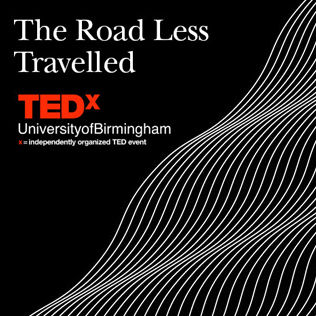TEDx 2015 - 'The Road Less Travelled'
- Location
- Great Hall - Aston Webb (R6 on campus map)
- Dates
- Saturday 21 March 2015 (10:00-16:30)

After a successful first event last year, TEDx returns to the University of Birmingham! With ideas worth spreading, some of Birmingham’s leading academics will grace the TEDx stage in the Aston Webb building on Saturday 21 March.
This is an opportunity to hear ideas at the pioneering end of research, stories about success coming from choosing to pave your own way. Our speakers will question the idea of conforming and share ideas worth spreading. Preconceptions will be challenged and debate will be sparked.
Tickets are on sale via the e-shop and will include a full day’s access to the TEDx University of Birmingham event, with lunch included in the price. Join us in taking another step on the road less travelled.
Why might good people deliver bad care?
HSMC's Yvonne Sawbridge will be taking part in this year's TEDx event, an opportunity to hear ideas at the pioneering end of research.
Britishness, equality and inclusion towards a future manifesto
Social Policy's Chris Allen will be taking part in this year's TEDx event, an opportunity to hear ideas at the pioneering end of research.
A Window onto Another World" – Virtual Reality for Hospital Rehabilitation
Project REVERE (REstorative Virtual Environments for REhabilitation) is an ongoing collaborative project involving the University of Birmingham's Human Interface Technologies Team and clinical teams at the Queen Elizabeth Hospital, also in Birmingham (QEHB). The research, which commenced in 2011, aims to investigate the impact of virtual reality reconstructions of real-world rural and coastal scenes on patient mental and physical rehabilitation outcomes.
Superconducting Seaweed: Adventures in Green Nanotechnology
Imagine the word 'chemistry' for a moment. You probably have a picture in your mind of someone in a white lab coat and goggles with brightly-coloured solutions bubbling away in front of them. There are almost certainly some toxic signs around! If you visit most chemistry research centres then you will probably see a lot of chemists that fit this picture quite well.
It is time to go small and nuclear
The UK is wrestling with its energy policy as it struggles to reduce its dependence on coal and imported gas in an attempt to boost low carbon generation and energy security. Offshore wind is now making a significant contribution. Shale gas, though not low carbon, is poised to make an impact. However, both are not without challenge; wind is intermittent and shale gas will require carbon capture and storage on a scale which remains to be demonstrated and credible.
Why don't you sleep more?
Many people see sleep as an unwelcome necessity, something that should be minimized because it gets in the way of life, a luxury that is a sign of laziness. Despite this, even those who would prefer not to sleep at all cannot function on less than a few hours sleep a night – but why is that?
Ten really good reasons why people should pay more inheritance tax
Social Policy's Karen Rowlingson will be taking part in this year's TEDx event, an opportunity to hear ideas at the pioneering end of research.
The Child is father of the Man: why children should be leading research projects
TEDx 2015: Dr Hannah Batchelor BSc, PhD, Paediatric Formulations Research Fellow, Pharmacy and TherapeuticsInvolving children in research. Children are the most natural scientists, they have curiosity and imagination that is the envy of many researchers across the world. So why shouldn't we tap into their ideas and take their suggestions forward.This talk will share insights in involving children and young people in research and the benefits this has for both the research community, children involved and commercial stakeholders.
815,827 - Dementia patients in the UK - and counting!
Dementia research has reached an impasse. Christmas is 2014 was marked by yet another failed Alzheimer drug. The pharmaceutical industry is losing interest in dementia because of the expensive failures. The number of patients is rising. As social care spending is gradually reduced the healthcare system will buckle under the pressure. We need a solution fast. We need funding for novel accelerated research on dementia. The big UK government pledge to answer "the dementia challenge" is still less than £100 per patient. It is time for the public to become actively engaged and help us to make a difference in dementia research.
Brave New (Media) World: Becoming An Academic-journalist-activist
TEDx talk by Professor Scott Lucas, Professor of International Politics, POLSIS. The rapidly-changing media environment and technology enable us to go beyond the defined but often detached roles of "academic", "journalist", and "activist". Instead of putting our interests and work into compartments such as the Ivory Tower, the News Report, or the Petition, we can pursue a dynamic combination of expertise, writing, speaking, and activism each and every day.